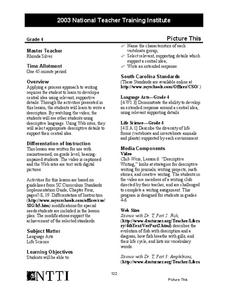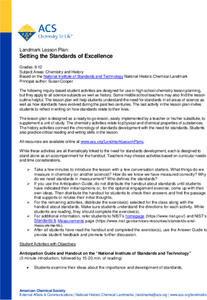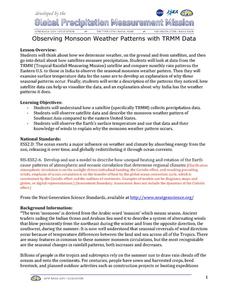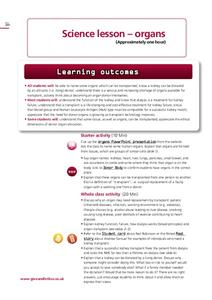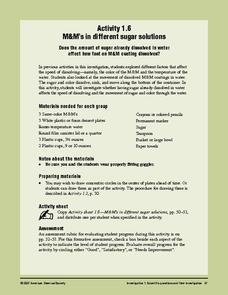ReadWriteThink
Persuasive Essay: Environmental Issues
Young environmentalists learn how to craft a persuasive essay about an environmental issue they consider important. After studying the components of a persuasive essay and examining a student model, writers brainstorm possible topics and...
Curated OER
Write a Description
Finding the central idea is the focus of this activity. Middle schoolers write descriptions of different animals using details and descriptive language. They watch a video of kids using descriptive language, and then use showing language...
Teach Engineering
Nanotechnology Grant Proposal Writing
Please, sir, can I have a few thousand dollars for my research? The last installment in a six-part lesson has the pupils develop a grant proposal. Class members apply their knowledge of skin cancer, ultraviolet radiation, human skin, and...
Alabama Learning Exchange
The Big Bang Theory: An Evidence-Based Argument
What evidence supports the big bang theory? Individuals analyze scholarly resources about the the theory and develop arguments backed by evidence. They brainstorm, share ideas, watch a video, and read articles to complete a graphic...
Consortium for Ocean Science Exploration and Engagement (COSEE)
Understanding the Food Web
Building on prior knowledge of the pervious lesson in the series, pupils explain the previous lesson to each other. Then they write a simple guide for a young child to read on the same topic.
American Chemical Society
Setting the Standards of Excellence
A number doesn't have much meaning without a standard of reference. Learners read about the history of developing standards to measure chemical and physical properties and complete reading guides to process the information. They focus on...
NASA
Observing Monsoon Weather Patterns with TRMM Data
Follow a fabulous slide show on how monsoons form and how satellite technology is being used to observe the phenomena, explaining why they occur. Afterward, visit the TRMM (Tropical Rainfall Measuring Mission) website to access actual...
Chicago Botanic Garden
Causes and Effects of Climate Change
Wrap-up a unit on global climate change with a lesson that examines the causes and effects of climate change. Learners fill out a chart that represents what they think causes climate change—natural and human-based—and what they think...
Chicago Botanic Garden
Causes and Effects of Climate Change
It's time for your class to literally show what they know! Pupils illustrate what they learned about the causes and effects of climate change by filling out a graphic organizer to complete the 5-part series of lessons. They discuss them...
PBS
Stories of Painkiller Addiction: Commitment to Recovery
Recovery from substance addiction is an ongoing process. The final lesson plan in a series about painkiller abuse and addiction prompts learners to research various recovery options before writing a short story about a character who is...
Out of Africa Wildlife Park
A Thematic Learning Guide to Lions
Written as an accompaniment to a field trip to the Out of Africa Wildlife Park in Arizona, this is an interdisciplinary, themed lesson on lions. Even if you cannot take your upper-elementary kids to this attraction, there are a few...
Terminix
The Pollinator
What do bees and children have in common? They both love their sweets. Decorate a flower pot or bucket to look like a brightly colored flower and fill it with wrapped candy and cheese puffs. Have learners reach into grab the candy,...
Chymist
Tritration: Standardization of a Base and Analysis of Stomach Antacid Tablets
Do antacid tablets really do what they claim? An experimental lesson attempts to answer this question. Individuals practice the process of titration during the first part of the experiment. They then use those skills to neutralize an...
Curated OER
Schoolyard Field Guide
Fourth graders observe, plan, research, and create a field guide for the trees that are in their schoolyard. In this trees lesson plan, 4th graders make careful observations of what they see around their school and create a guide.
Baylor College
Post-Assessment: Global Atmospheric Change
Find out how much your earth scientists learned about the atmosphere in the unit on global atmospheric change with this assessment. After writing a letter to persuade others to make changes to protect our atmosphere, pupils take the same...
Nemours KidsHealth
Human Body Series: Immune System
When you work with school children, teaching about immunity and illness prevention is a priority! This approach includes a discussion, kid-friendly online articles, a creative writing assignment, and a quiz on the role of leukocytes and...
Curated OER
Acid Rain
Create a simulation of acid rain in your classroom with lemon juice and bean plants to help kids study the effects of pollution on plants. In addition, learners will listen to a story and write responses based on guiding questions.
Baylor College
Hormones and Stress
As a more personal part of a unit on brain chemistry, your class discusses stressful situations and the body's response to them. They talk about how, while the reactions are initially helpful, some can be harmful to your health. Finally,...
Curated OER
Connect the Spheres: Earth Systems Interactions
Is everything really connected? Take your class on a walk outside, where they will make observations and write them down on a worksheet. Once they are back in the classroom, learners will work to determine if and how things like birds,...
Give and Let Live
Blood and Transplant: Organs
Who donates organs, and how do organ donations work? The third lesson in a four-part series discusses the tremendous need for donor organs of all ages and backgrounds. A variety of materials, included with the teacher's guide, walk...
Serendip
Homeostasis, Negative Feedback, and Positive Feedback
So many bodily activities depend on homeostasis! Give learners a solid background to understand the basic process of the human body. Scholars first examine negative feedback loops contributing to body temperature regulation and then a...
Curated OER
How Does Your Garden Grow?
Young gardners read and listen to books about seeds, plants, and the growing process. They plant seeds in plastic cups to observe the process of root-growing and plant formation. The whole class walks through a field to collect seeds...
American Chemical Society
M&M's in Different Sugar Solutions
To conclude a mini unit on the dissolving of M&Ms® candy coating, this lesson investigates whether or not the concentration of sugar in the solvent affects the dissolving rate. Consider having older science learners write their own...
Curated OER
Following a Recipe
Learners create a cookbook. In this recipe and writing lesson, students brainstorm the skills necessary to follow a recipe, watch a cooking show and write down a recipe used. Learners use a word processing program to write a paragraph...



